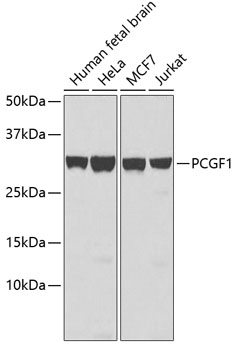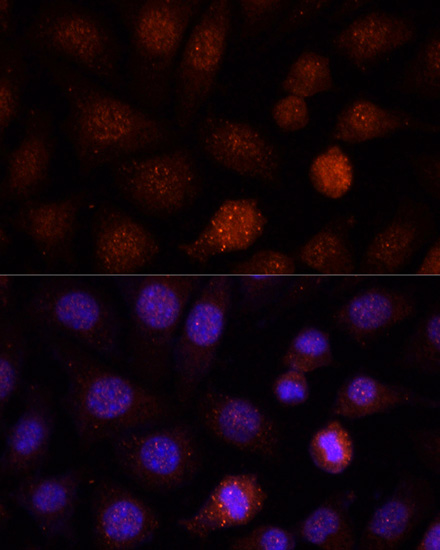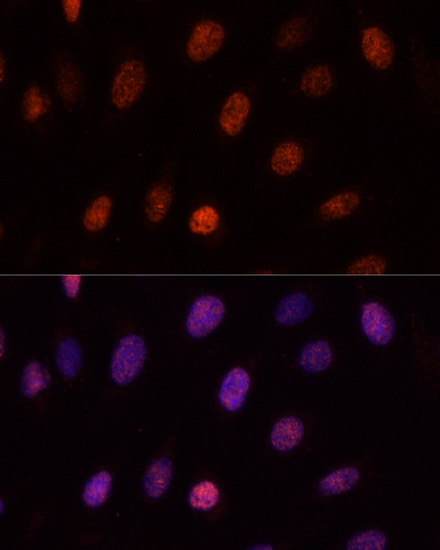-
Product Name
PCGF1 Polyclonal Antibody
- Documents
-
Description
Polyclonal antibody to PCGF1
-
Tested applications
WB, IF
-
Species reactivity
Human, Mouse
-
Alternative names
PCGF1 antibody; 2010002K04Rik antibody; NSPC1 antibody; RNF3A-2 antibody; RNF68 antibody; polycomb group ring finger 1 antibody
-
Isotype
Rabbit IgG
-
Preparation
Antigen: Recombinant fusion protein containing a sequence corresponding to amino acids 20-259 of human PCGF1 (NP_116062.2).
-
Clonality
Polyclonal
-
Formulation
PBS with 0.02% sodium azide, 50% glycerol, pH7.3.
-
Storage instructions
Store at -20℃. Avoid freeze / thaw cycles.
-
Applications
WB 1:500 - 1:2000
IF 1:50 - 1:200 -
Validations

Western blot - PCGF1 Polyclonal Antibody
Western blot analysis of extracts of various cell lines, using PCGF1 antibody .Secondary antibody: HRP Goat Anti-Rabbit IgG (H+L) at 1:10000 dilution.Lysates/proteins: 25ug per lane.Blocking buffer: 3% nonfat dry milk in TBST.

Immunofluorescence - PCGF1 Polyclonal Antibody
Immunofluorescence analysis of L-929 cells using PCGF1 antibody at dilution of 1:100. Blue: DAPI for nuclear staining.

Immunofluorescence - PCGF1 Polyclonal Antibody
Immunofluorescence analysis of U-2OS cells using PCGF1 antibody at dilution of 1:100. Blue: DAPI for nuclear staining.
-
Background
Component of the Polycomb group (PcG) multiprotein BCOR complex, a complex required to maintain the transcriptionally repressive state of some genes, such as BCL6 and the cyclin-dependent kinase inhibitor, CDKN1A. Transcriptional repressor that may be targeted to the DNA by BCL6; this transcription repressor activity may be related to PKC signaling pathway. Represses CDKN1A expression by binding to its promoter, and this repression is dependent on the retinoic acid response element (RARE element). Promotes cell cycle progression and enhances cell proliferation as well. May have a positive role in tumor cell growth by down-regulating CDKN1A. Component of a Polycomb group (PcG) multiprotein PRC1-like complex, a complex class required to maintain the transcriptionally repressive state of many genes, including Hox genes, throughout development. PcG PRC1 complex acts via chromatin remodeling and modification of histones; it mediates monoubiquitination of histone H2A 'Lys-119', rendering chromatin heritably changed in its expressibility. Within the PRC1-like complex, regulates RNF2 ubiquitin ligase activity. Regulates the expression of DPPA4 and NANOG in the NT2 embryonic carcinoma cells.
Related Products / Services
Please note: All products are "FOR RESEARCH USE ONLY AND ARE NOT INTENDED FOR DIAGNOSTIC OR THERAPEUTIC USE"
